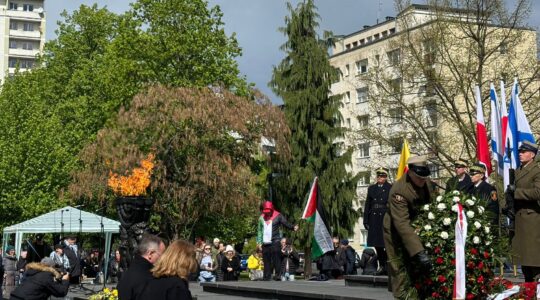BERLIN (JTA) – When Johanna Rau first stumbled upon the abandoned synagogue of Heubach, Germany, a few years ago, its roof was falling in and old mattresses sat on the floor.
Word was it had been used by a motorcycle gang.
Rau, 43, a Protestant pastor who became interested in Judaism while pursuing her divinity degree at Heidelberg University , which also has a college for Jewish Studies, decided to rescue the forgotten synagogue 40 miles from Stuttgart.
She formed a committee to buy and renovate the building, secured funding from the European Union and in 2006 reopened the Heubach Country Synagogue as a place where Jews and non-Jews could learn about Jewish tradition and more than 1,000 years of Jewish history in Germany.
Last week, Rau was one of six non-Jewish Germans honored with the Obermayer German-Jewish History Award. The ceremony, held Jan. 23, was part of a series of events in Germany marking International Holocaust Remembrance Day, which was Sunday.
Now in its eighth year, the Obermayer award was created by American Jewish philanthropist Arthur Obermayer, whose roots are in Creglingen. Winners are nominated by Jews with German roots, most of them living in the United States, Israel or Britain.
For decades these non-Jewish Germans have tried to peel away Germany’s layers of forgetting, and their stories of discovery often are profoundly moving. In many cases their efforts have led to friendships with erstwhile German Jews or their children. Sometimes the result is a disconcerting mix of pain and hope.
When Rau launched the project to revive the Heubach shul – which had been sold by the Jewish community under duress in the 1937, then used as a town hall until 1972 before being abandoned – workers discovered the original mikvah under the floor. Rau then went to the synagogue’s neighbors; eventually that got the older generation talking.
“Do you remember Simon Goldschmidt?” she would ask. “And then the stories came.”
In the renovated synagogue, there is a shadow where the holy ark once stood.
“Everything you see hints at things you cannot see,” Rau said.
Another Obermayer award winner, Helmut Urbschat, experienced the last two months of World War II as a 12-year-old boy in Berlin.
“We got the whole downfall of Hitler right under our noses,” he said.
Years later, as a high school teacher in Vlotho, Urbschat said he was “dismayed to find out that youngsters didn’t know a thing about the Jewish past” of the town.
Wanting to make sure “that not one name should be lost or forgotten” of Vlotho’s Jews, he and colleague Manfred Kluge created a memorial, started an annual Jewish cultural week and wrote a book about Vlotho’s Jewish history.
But Urbschat said such efforts at remembering Vlotho’s Jewish history, as opposed to the Holocaust itself, are limited.
“Nobody should think that this Jewish history is a concern of the broad public in our little town,” he said. “We are and will remain a small group.”
Fritz Reuter, who also received an Obermayer award, became interested in the city of Worms’ Jewish history when as a young man, he heard people refer to shops by their old, Jewish names: Kaufhaus Knopp, Goldschmidt.
He began researching the Worms Jewish history in the city’s archive, learning that the first synagogue was built there in 1034 and that the great Talmudic scholar Rashi had studied in the city.
In 1987, Reuter’s book, “Warmaisa: 1,000 Years of Jews in Worms,” became the first comprehensive study of the city’s Jewish past.
Reuter, 78, is known today for creating Germany’s first postwar Jewish museum in his home city.





